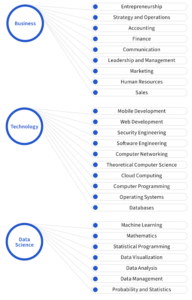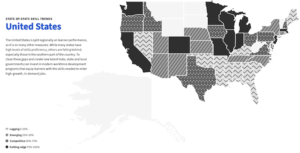Coursera has released its latest Global Skills Report, sharing key insights for business skills and technology skills in both the U.S. and worldwide. The report names the acceleration of digital transformation, inflation, and global instability as factors inducing the rising demand for digital skills.
According to Coursera: “The Global Skills Report draws data from 100 million learners in more than 100 countries who have used Coursera to develop a new skill during the past year. The report benchmarks three of the most in-demand skill areas driving employment in the digital economy – business, technology, and data science.”

The full set of competencies for which Coursera measures learner proficiency in the Global Skills Report, grouped by domain. Source: Coursera
The report ranks the U.S. 29th in overall skills proficiency, lagging behind countries in Asia and Europe. The country’s technology skills proficiency dropped from 69% in 2021 to 43% in 2022. Data science skills fell from a proficiency of 73% to 54% in the same year. Interestingly, Idaho was the winner of the tech skills race (even beating out known tech hubs California and Massachusetts) which the report says shows the 61% increase in the number of technology companies moving there in the last decade. Idaho’s Coursera learners showed 100% proficiency in mobile development skills, which is just one example of the kinds of digital skills in demand right now. “Digital skills are the shared language of the modern economy. Not every worker needs to learn how to code, but every worker needs to be literate in digital skills,” stated the report’s executive summary.
Despite the rather dim technology and data science skills rankings, U.S. business skills proficiency rose from 40% in 2021 to 67% in 2022, especially in areas like leadership and management. The Midwest ranked the highest for business skills, most notably in Illinois, Wisconsin, and Indiana, followed by states in the Northeast and Pacific Coast. The southern U.S. was shown to be lagging in this area. Business learners showed a desire to brush up on what the report calls “human skills,” such as resilience, project management, decision making, planning, storytelling, and experimentation, which Coursera says was spurred by the pandemic’s disruptive effects.
As for global insights, the report named Switzerland in the number one spot for overall skills, with 99% proficiency in business, 94% in technology, and 97% in data science. Denmark moved up 5 spots from last year’s ranking to place second this year, while Germany moved down 5 places to rank ninth. Indonesia ascended 39 places in the rankings to grab the third place, and the report says that countries like it, Singapore (#5), and Japan (#6) are leading the Asia Pacific region due to having invested heavily in human capital, specifically in the area of skill development. India climbed six places in the rankings for technology skills, coming in at #56, but fell 12 places in data science skills to be ranked 76th, highlighting a need for more training and resources in this sector.
“The Great Resignation and automation are mandating stronger investments in human capital, as institutions must prioritize developing the high-demand digital and human skills required to build a competitive and equitable workforce,” said Coursera CEO Jeff Maggioncalda. “Our data shows these skills are not equally distributed, and students and low-wage workers need access to flexible, affordable, and fast-tracked pathways to entry-level digital jobs that offer a foundation for a stronger and more inclusive economy.”
Coursera was founded by Stanford computer science professors Andrew Ng and Daphne Koller and offers self-guided, on-demand courses in many subjects. The platform boasts of having “100 million learners, 7,000+ institutions, and more than 5,000 courses from 250 of the world’s leading universities and industry educators.”
To download the full report, visit this link.
Related Items:
Meet Andrew Ng, a 2022 Datanami Person to Watch
Shrinking the Education Gap in Data Science
How Academia Could Help Close the Technology Skills Gap
The post Coursera Report Ranks Global Skills in Business, Tech, and Data Science appeared first on Datanami.


0 Commentaires